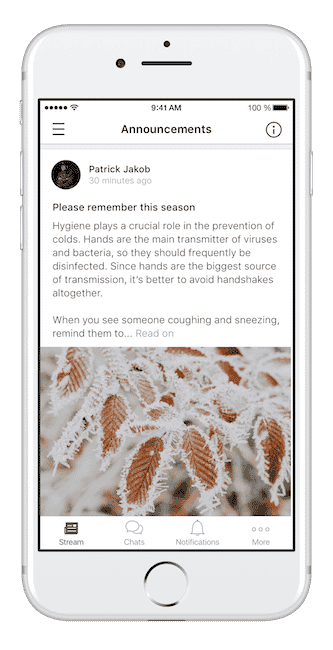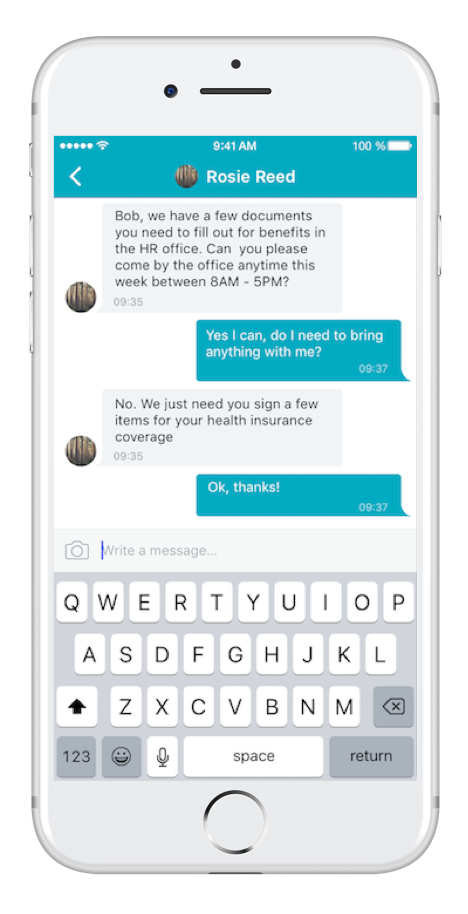Immediate and direct communication in healthcare environments is essential. The health and wellness of patients depends on a clear and accurate exchange of information.
Learn the best internal communication strategies for mobile healthcare workers.
As many employees in the healthcare field travel to various facilities and make home visits, real-time communication can be especially challenging. Healthcare workers don’t regularly check email as most of their time is spent on the go, working with patients, so it’s difficult to stay current on company updates and important announcements. But effective communication in healthcare is more important than ever.
Improving Communication in Hospitals
The importance of communication in hospitals cannot be stressed enough. The impact of ineffective communication in healthcare settings not only has the ability to affect the patient experience, but it can contribute to a financial loss at various facilities and negatively affect workplace morale.
Although ways to improve communication may not happen overnight, the effort is critical to reduce miscommunication and alleviate stress for both healthcare workers and patients. Here are five ways to ensure effective communication between healthcare professionals.
1. Assess Your Current Method of Communication
Before you can make improvements to your internal communication, you need to assess your current efforts. As someone who works in the healthcare sector, you already know how important it is to avoid making costly and even potentially fatal mistakes.
Are there any obvious gaps in your communication that result in mistakes? Take detailed inventory of what works and what doesn’t.
Once you’ve assessed your communication, it’s time to ask for feedback and create an internal communications strategy. A great example of good communication is allowing your staff to have a voice, listen to their feedback, and make appropriate changes. If you want to improve communication, you must be willing to listen.
Pro tip: Do a gap analysis to determine where you can improve your communication in your healthcare system.
2. Streamline Communication Channels
Working in healthcare, there are protocols you undoubtedly need to follow, but when you do your assessment of your current state of communication, don’t forget to see if there are ways to streamline your channels. Communication should be simple, but it can quickly become convoluted and complicated.

As long as you ensure your communication remains confidential and secure, you may be able to eliminate some unnecessary steps, which often end up causing confusion or are time-consuming to navigate. The bulk of your communication can happen in one simple, mobile-friendly interface that doesn’t even involve email. Pro tip: Utilize healthcare call center services to centralize and manage communication, which can significantly reduce miscommunication and enhance overall efficiency.
3. Encourage Mobile Collaboration for Effective Communication Between Healthcare Professionals
Today, pagers remain a mandatory means of communication in many healthcare facilities. While pagers may be an effective way to alert someone to return your call ASAP, they’re not always an effective or practical way to conduct a two-way conversation.
Since healthcare workers aren’t huge fans of email, encourage top-down, bottom-up, and peer-to-peer communication via a mobile team communication app. If you’re worried about professionalism, establishing a Code of Conduct and BYOD (bring your own device) policy will keep your expectations clear without worrying about issues like time management.
In an age of technology where roughly three-quarters of American adults own and use a smartphone, it’s only natural to encourage its use at a professional level for real-time messaging. (Let’s face it, almost every employee is using their mobile phone anyways.)

4. Give Healthcare Employees a Voice
Similar to what we mentioned above, when you give every employee a voice and value their input, the communication between your staff will improve. While you may work in an office and do minimal traveling from one facility to the next, another member of your staff may travel so much that their car doubles as a home office.
Whether you see your staff a few times a day or about ten minutes a week, each individual should have the same opportunity to express concerns, needs, and wants. Once employees don’t feel like their voice is being heard, good communication comes to a halt.
Pro tip: A mobile employee app facilitates real-time communication between healthcare workers and supports the time-sensitive nature of their work.
5. Prioritize Face-To-Face Communication
As you begin to use technology more and more to communicate with one another, don’t forget about the value of face-to-face communication. In-person meetings are critical to establishing effective communication between healthcare professionals.
Mandatory meetings are often met with anything but enthusiasm, especially when you have staff that may already feel overworked and spread too thin between various tasks. While you may not have the power to eliminate mandatory face-to-face meetings, try to make the “in-person” time you have with your staff count.
Paying attention and being an active listener not only shows your staff you care enough to be “present,” but that you value their efforts and want to know more about their experiences at work.
These seemingly simple actions, if done correctly, will set a solid precedence and your staff is more likely to practice these same actions when working with coworkers and patients.
Most frequently asked questions
Why is effective communication important in healthcare?
The importance of communication in hospitals cannot be stressed enough. The impact of ineffective communication in healthcare settings not only has the ability to affect the patient experience, but it can contribute to a financial loss at various facilities and negatively affect workplace morale.
How can you improve communication between healthcare professionals?
- Prioritize Face-To-Face Communication
- Assess Your Current Method of Communication
- Streamline Communication Channels
- Encourage Mobile Collaboration for Effective Communication Between Healthcare Professionals
- Give Healthcare Employees a Voice

About the author
Beekeeper
We make frontline lives easier, work safer, and teams more connected so businesses can reach new heights. At Beekeeper, we’re dedicated to making frontline lives easier by connecting workers with the tools, support, and information they need to feel valued, do their best work, and drive the business forward.








